‘Starship Troopers’: The $100-million movie adaptation of a ‘very right-wing book’
Paul Verhoeven’s misunderstood film, which mixed giant insects with a subtle parody of the military world, is making headlines once again with the news that, nearly 30 years later, Columbia Pictures is planning a new adaptation of the story
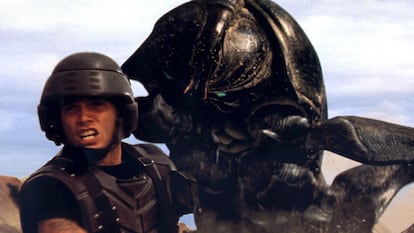
Science fiction cinema has presented us with two genocides, both met by their indirect victims with startling indifference. The first occurs in Star Wars: Episode IV - A New Hope, where Alderaan — no mere lost island or remote desert village, but an entire planet with millions of inhabitants — is destroyed. In what Wookieepedia describes as “one of the most cruel and vile acts of the Galactic Empire,” Grand Moff Tarkin, admiral of the Death Star, obliterates an entire celestial body in an instant, sending “an intense shock to the Force,” yet Leia Organa, princess of Alderaan, accepts the annihilation of her homeworld with remarkable stoicism.
The second catastrophe is the destruction of 23rd-century Buenos Aires in Starship Troopers. This time, the perpetrator is an arachnid force from outer space, which causes a mere mild annoyance in two of the film’s protagonists, Juan Rico (Casper van Dien) and Carmen Ibáñez (Denise Richards), both from Buenos Aires province. However, they curiously speak English. Argentine writer Jorge Luis Borges once described Buenos Aires as “as eternal as water and air,” but in Paul Verhoeven’s irreverent film, the city is erased from the map in an instant, without the slightest reverence.
Recently, Sony and Columbia Pictures confirmed that a remake of Starship Troopers is officially in development. It will be directed by South African filmmaker Neill Blomkamp, known for District 9 (2009), Elysium (2013), and Chappie (2015), and produced by his frequent collaborator, Canadian Terri Tatchell. While few details have been revealed about the project, Columbia has said that it will be a faithful adaptation of Robert A. Heinlein’s novel, on which the original film was based.
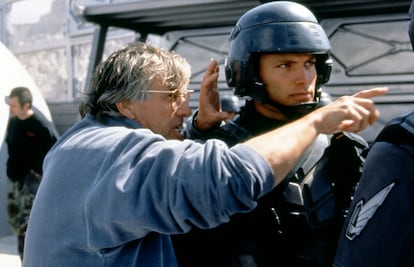
First published in 1959, Starship Troopers, winner of the Hugo Award for Best Science Fiction Novel, is a rather chaotic chronicle of the conflict between the Earth Federation and a race of insect-warriors from the planet Klendathu. The novel follows Argentine recruit Juan Rico, and, through the lens of its protagonist — an idealistic young patrician with reactionary views — deliberately advocates for caudillismo and military dictatorship, extreme warmongering, selective suffrage (arguing that only those willing to risk their lives for their country should have the right to vote), corporal punishment, and the death penalty.
As Calum Marsh discussed in an in-depth article for The Atlantic, one thing was certain when director Paul Verhoeven began working on Starship Troopers: he had no intention of staying “faithful” to either the letter or the spirit of Heinlein’s novel. In fact, a quick read of the first two chapters was enough for Verhoeven to dismiss it as “a very right-wing book.” He agreed to direct the film because he already had a first draft of the script from one of his favorite screenwriters, Edward Neumeier, who had previously worked on RoboCop (1987), one of Verhoeven’s biggest successes. Neumeier’s script was a sharp and uncompromising deconstruction of Heinlein’s heavy-handed militaristic rhetoric.
When Verhoeven began filming Starship Troopers in April 1996, his Hollywood career had just hit a rough patch. Born in Amsterdam in 1938, the Dutch director had made a name for himself at 30 with the period drama series Floris, where he first worked with his future favorite actor, Rutger Hauer. After successes in his native Netherlands with films like Turkish Delight, Katie Tippel, Soldier of Orange, The Great Outdoors, and The Fourth Man, Verhoeven made the leap to Hollywood to direct the gritty Flesh and Blood, once again teaming up with Hauer.
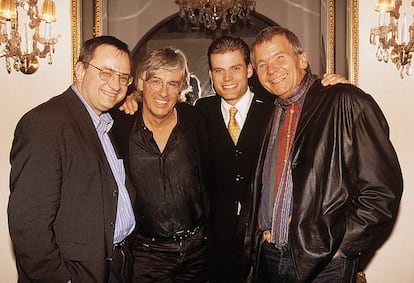
Then came three massive hits in quick succession: RoboCop, Total Recall, and Basic Instinct. But soon after, came his first flop, Showgirls (which cost around $50 million and grossed just $35 million). At the time, it was misunderstood, but has since become a cult classic. To make matters worse, Verhoeven wasted precious time on aborted projects, such as Crusade with Arnold Schwarzenegger and the ill-fated production company Carolco Pictures, and Mistress of the Sea, a bloated and poorly executed attempt to revitalize pirate films, which also ended in failure.
By the spring of 1996, Verhoeven knew he was putting his Hollywood career on the line with one final gamble, and that gamble was Starship Troopers. Given the circumstances, it seemed logical to follow what the production companies, TriStar Pictures and Touchstone, were asking of him: use the more than $100 million available to turn Heinlein’s novel into a fast-paced, straightforward action blockbuster. But Verhoeven and Neumeier insisted on taking a different approach — a balance between spectacle and sharp social satire, a path they had already explored together in RoboCop.
Story of a colossal mistake
The project was nearly canceled in both the summer of 1994 and the spring of 1995, when it became clear to everyone involved that Verhoeven had a very different vision for the film than the one the producers had in mind. The director played his best card — the arachnid creatures designed by stop-motion visual effects genius Phil Tippett — and presented TriStar with a brief sequence filmed in California’s Vasquez Rocks park in November 1994. The sequence was only a couple of minutes long, but it cost nearly a quarter of a million dollars.
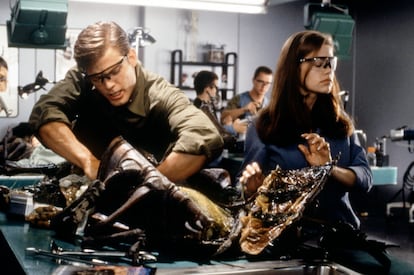
TriStar eventually accepted the project, with a slightly revised budget, but not before demanding a redraft of the script that would reduce the satire in favor of pure action. Another cost came with the cast, which was originally intended to feature top-tier young actors handpicked by Verhoeven himself, such as Matt Damon, Mark Wahlberg, Chris O’Donnell, and Christian Slater. Instead, for reasons more financial than artistic, the cast was filled with actors who had previous careers in television or modeling, including Denise Richards, Neil Patrick Harris, Casper van Dien, Seth Gilliam, and Dina Meyer. Only one of Verhoeven’s regulars, veteran Michael Ironside, survived the invasion of young, photogenic faces from series like Melrose Place and Beverly Hills, 90210.
The filming, which was eventful to say the least, took place in locations such as Long Beach, California, and the Hell’s Half Acre natural park in Wyoming, which became the rugged and inhospitable planet Klendathu — the site of the decisive confrontation between human elite troops and the insectoid creatures responsible for the destruction of Buenos Aires. In May, during an open filming session attended by several journalists, a tragic accident occurred: a mass collision that killed the driver of a transport truck and two members of the production crew, while seriously injuring television presenter Rachel Campos, the girlfriend of one of the dead crew members.
Poison for the box office
By then, Starship Troopers already had a curse hanging over it. It didn’t help that Verhoeven, ever the provocateur, claimed in promotional interviews that he had been inspired by the “great cinema” of Nazi sympathizer Leni Riefenstahl to take the war genre to “a new dimension.”
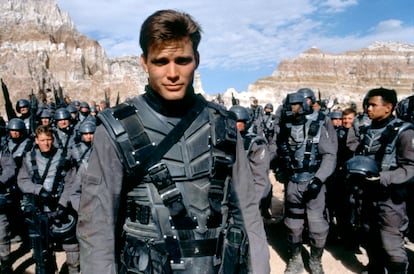
Wim Wenders once said that cinematic subtlety and irony are “dead languages” because viewers, sickened by literalism, have stopped speaking them for several decades now. A similar fate befell Starship Troopers, which was initially interpreted by critics and viewers as an apologia for the chauvinistic militarism that its creators had actually intended to mock with intelligent cruelty. The film had a promising start at the box office but was ultimately hindered by negative press, leading to disappointing box office returns far below expectations.
Years later, Verhoeven admitted that his strategy of appropriating the enemy’s weapons — such as a fascist aesthetic, the hollow emptiness of mid-1990s television, advertising, and the burgeoning video game industry — had been too bold. After directing yet another Hollywood failure, Hollow Man, his influential American backers lost patience and sent him back to Europe, where he has continued to perform inspired balancing acts on the thin line that separates the sublime from the ridiculous.
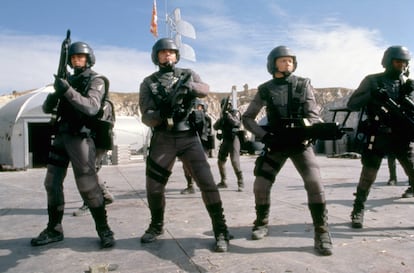
Anyone considering adapting Heinlein’s Starship Troopers at this point should be acutely aware that they’re dealing with sensitive, potentially radioactive material, and should not lose sight of Verhoeven’s example. Therefore, Columbia’s attempt to faithfully adapt the novel is, at the very least, questionable. What will remain of this formidable satire if you strip away the irony that gave it its meaning?
Sign up for our weekly newsletter to get more English-language news coverage from EL PAÍS USA Edition
Tu suscripción se está usando en otro dispositivo
¿Quieres añadir otro usuario a tu suscripción?
Si continúas leyendo en este dispositivo, no se podrá leer en el otro.
FlechaTu suscripción se está usando en otro dispositivo y solo puedes acceder a EL PAÍS desde un dispositivo a la vez.
Si quieres compartir tu cuenta, cambia tu suscripción a la modalidad Premium, así podrás añadir otro usuario. Cada uno accederá con su propia cuenta de email, lo que os permitirá personalizar vuestra experiencia en EL PAÍS.
¿Tienes una suscripción de empresa? Accede aquí para contratar más cuentas.
En el caso de no saber quién está usando tu cuenta, te recomendamos cambiar tu contraseña aquí.
Si decides continuar compartiendo tu cuenta, este mensaje se mostrará en tu dispositivo y en el de la otra persona que está usando tu cuenta de forma indefinida, afectando a tu experiencia de lectura. Puedes consultar aquí los términos y condiciones de la suscripción digital.









































